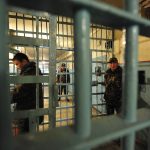In Central Asia, justice systems have long relied on coerced confessions and torture is systematic and widespread.
A high degree of corruption and lack of public education and awareness about torture contribute to the silence in which torture occurs. Victims and their families do not trust the judiciary and the legal system and fear reprisals if they press for punishment of perpetrators. Many cases of alleged torture are not investigated and cases that are investigated rarely result in convictions.
Since 2011, PHR has partnered with Central Asian human rights activists to help create cultures of accountability and respect for human rights. Our PHR-trained national trainers have taught thousands of medical and forensic experts, defense attorneys, prosecutors, and judges to use the Istanbul Protocol – the UN standards for torture investigation and documentation that were developed with PHR’s leadership.
Our work has brought about a sea change in attitudes about torture. In Kyrgyzstan and Tajikistan, ministries of health have officially recognized the Protocol and adopted Istanbul Protocol National Plans of Action. In 2014, two Kyrgyz police officers were sentenced to 11 years in prison for torturing several minors. This was the first case – ever – of criminal punishment under the torture statute.
In 2015, PHR’s Istanbul Protocol national trainer in Tajikistan submitted the first forensic medical evaluation of an alleged torture victim in that country using Protocol standards. In 2016, after sustained pressure by PHR and our local partners over the past several years, the Parliament of Tajikistan revised the Criminal Procedure Code to allow for independent forensic medical evaluations. In the summer of 2018, two Tajik officials were jailed after evidence provided by a PHR-trained medical professional showed they had caused the death of a political prisoner by torture.
Working with partners, we have also facilitated policy and legislative reforms and helped strengthen infrastructures to investigate and prosecute torturers. Based on our success in Central Asia, we are in the process of expanding our work to include Ukraine and other countries.

